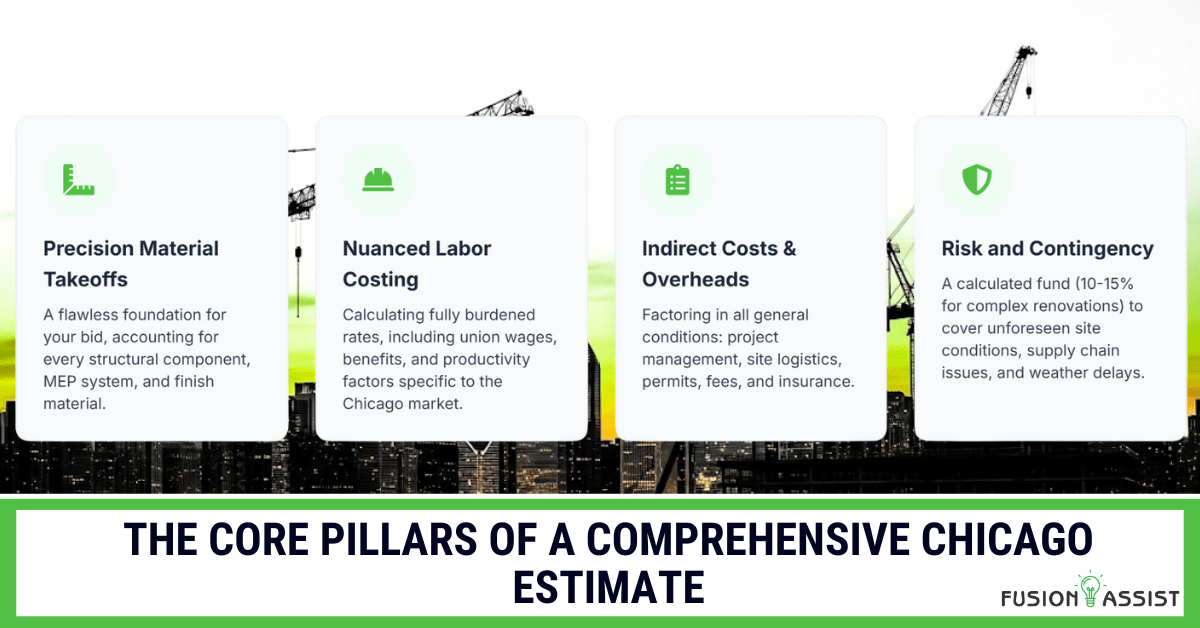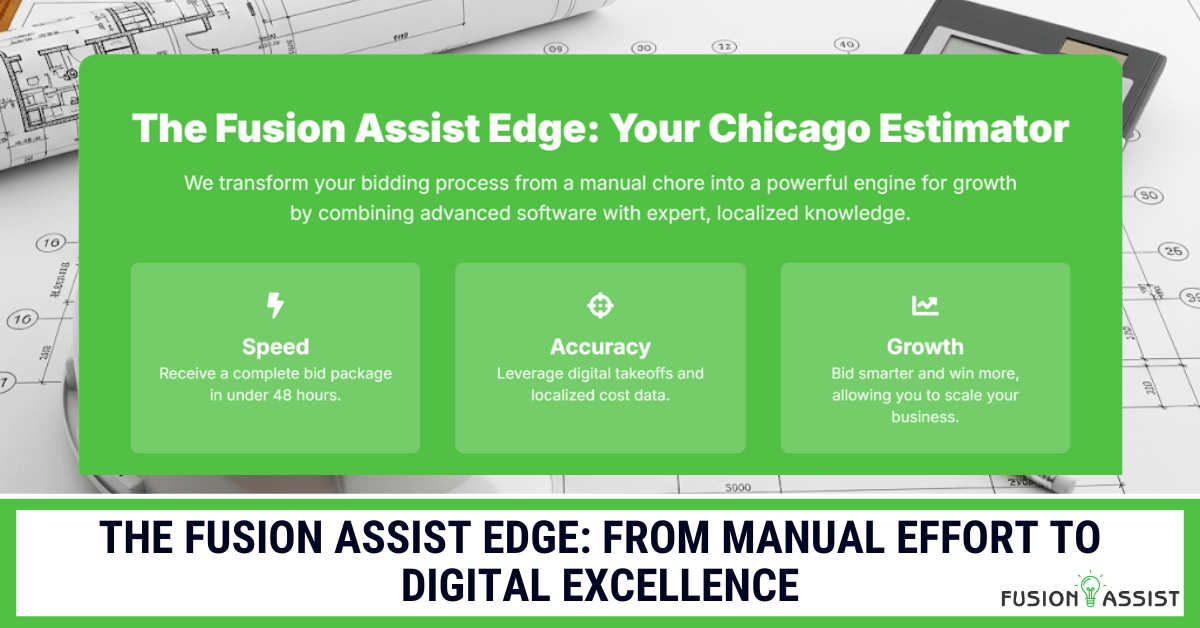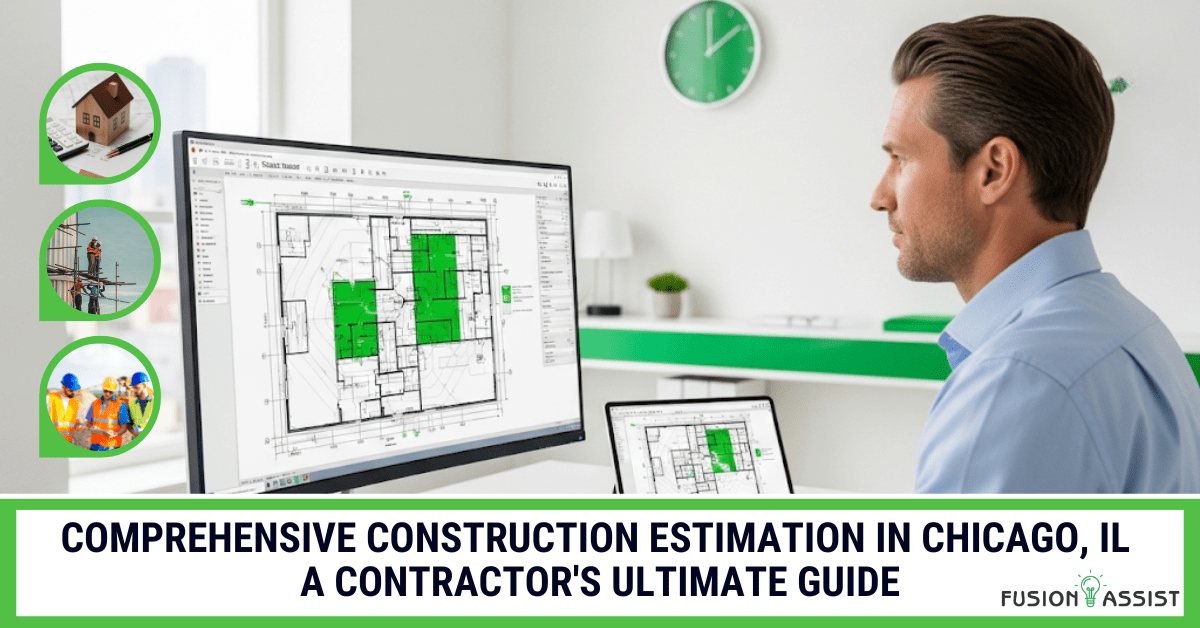Introduction
The skyline of Chicago itself is a symbol of its unstoppable development rate, and this is why its construction industry is extremely profitable and at the same time extremely challenging. For a general contractor in Chicago, every project—from a commercial build-out in the Loop to a new industrial facility in the suburbs—is a high-stakes endeavor. Here the distinction between a landmark success and a cautionary tale is frequently made by the quality of your initial estimate. A “good enough” bid simply won’t cut it; you need a truly comprehensive construction estimate that serves as your roadmap to profitability.
Most contractors get into the trap of thinking that an estimate is merely a price label that is going to secure a contract. As a matter of fact, a comprehensive estimate is a strategic document. It is your plan, it is your risk assessment and it is your guarantee to the client, all in one. It demonstrates your expertise, justifies your costs, and shields your business from the devastating impact of cost overruns. In a market as complex as Chicago, with its unique labor dynamics and stringent building codes, a detailed and accurate bid isn’t just an advantage—it’s a necessity.
This guide is designed to be the definitive resource for construction bidding in Chicago, IL. We will dissect what “comprehensive” truly means, explore the essential pillars of an unshakeable estimate, and demonstrate how partnering with a premier Chicago construction estimator like Fusion Assist can elevate your bidding process from a necessary chore to a powerful engine for growth.
What Does “Comprehensive Estimation” Really Mean?
An overall estimate is much more than a list of materials and an all-in-lump sum of labor. It is a comprehensive financial model of the whole project life. It’s a document that anticipates challenges, accounts for every detail, and leaves no room for doubt or ambiguity.
In the Chicago market context this implies that your estimate should consider:
- All Project Phases: From the initial conceptual budget during preconstruction to the final, detailed bid.
- Localized Costs: Factoring in the specific costs of materials, equipment, and labor (including Chicago union labor costs) in the region.
- Regulatory Compliance: Adhering to the City of Chicago’s building codes and Illinois construction regulations.
- Risk Management: Identifying potential risks, such as weather delays or logistical challenges in a dense urban environment, and building in appropriate contingencies.
A real thorough estimate is a story. It demonstrates to the client that you have thought of every detail and are ready to go with every eventuality and it makes you a real professional right at the beginning.
The Core Pillars of a Comprehensive Chicago Estimate
 To build an estimate that is both competitive and profitable, you must focus on four unshakable pillars. The failure to develop any of them or failure to develop them adequately may collapse the whole structure of your bid.
To build an estimate that is both competitive and profitable, you must focus on four unshakable pillars. The failure to develop any of them or failure to develop them adequately may collapse the whole structure of your bid.
Pillar 1: Precision Material Takeoffs
Consider the material take off as the foundation of your whole bid. It is the painstaking procedure of measuring all and any of the items needed in the project. This isn’t just about counting bricks and studs; it’s about a detailed analysis of blueprints to determine:
- Structural Components: The exact tonnage of structural steel and cubic yards of concrete.
- MEP Systems: The linear footage of piping, wiring, and ductwork, plus the count of all fixtures and units.
- Interior and Exterior Finishes: The square footage of drywall, flooring, roofing, and facade materials.
An error here can lead to costly last-minute material orders or wasteful overages. Utilizing professional construction takeoff services in Chicago that employ digital software ensures this foundational step is flawless.
Pillar 2: Nuanced Labor Costing
Labor is a very complicated variable in Chicago. An extensive estimate will entail a thorough knowledge of the domestic labor market. This includes:
- Burdened Labor Rates: You must calculate the fully burdened cost, which includes not just the base wage but also payroll taxes, workers’ compensation, general liability insurance, and contributions to union benefits and pension funds.
- Productivity Rates: You need to realistically project how long tasks will take. This may be affected by logistics of the sites, the experience of the crew, and even the notorious Chicago weather, which can affect exterior work months at a time.
- Union vs. Non-Union: Understanding the specific work rules and jurisdiction of different trade unions is critical to avoiding disputes and accurately forecasting costs.
Pillar 3: Factoring in All Indirect Costs & Overheads
This is where many contractors lose their profit margin. A winning bid must account for every cost, not just the direct ones. These general conditions and overheads include:
- Project Management: Salaries for project managers, superintendents, and administrative staff.
- Site Logistics: Costs for fencing, security, on-site trailers, sanitation, and material hoisting in tight urban spaces.
- Permits and Fees: The specific costs associated with securing permits from the City of Chicago Department of Buildings.
- Equipment and Insurance: Rental costs for cranes and other equipment, as well as the project-specific insurance policies required.
Pillar 4: Incorporating Risk and Contingency
No project goes exactly as planned. A comprehensive estimate acknowledges this reality by including a contingency fund. This isn’t a “slush fund”; it’s a calculated amount designed to cover genuinely unforeseen circumstances. For a Chicago project, this could include:
- Unexpected site conditions discovered during excavation.
- Supply chain disruptions affecting material delivery.
- Weather-related delays that push the schedule back.
A well-calculated contingency protects you from absorbing the cost of these issues and shows the client that you are a prudent and realistic planner.
Case Study: A Complex Mixed-Use Development in the West Loop
Client
A general contractor in Chicago that wants to enter bigger and more complicated projects.
Challenge
A new mixed-use development project in the trendy West Loop neighborhood was up for bid. The project involved complex structural steel, high-end residential finishes, and ground-floor retail space, all on a tight urban footprint. The in-house team of the contractor was overworked, and they were aware that one mistake would turn their bid uncompetitive or unprofitable.
Fusion Assist Solution
The contractor partnered with Fusion Assist. They forwarded to us all the plans and our team got down to work. Using digital takeoff tools, we generated a precise bill of materials for every trade. Our estimators, using a localized database of Chicago construction costs, applied accurate, fully burdened union labor rates and factored in the logistical costs of working in a congested area.
Result
In under 48 hours, the contractor received a complete, professional, and highly detailed bid package. The accuracy and the clearness of the estimate enabled them to submit their proposal with complete confidence. They secured the contract and they attribute it to the professionalism of their bid and thoroughness of their bid which made them stand out among the rest. The project was done under budget and this greatly improved their reputation and set them up to do such large scale projects in the future.
Conclusion: Build Your Chicago Legacy on a Foundation of Certainty
In the competitive construction industry of Chicago, your estimate is not just a bid, but the most important business tool. It is the basis of the profitable projects and reputation that will last. By moving beyond simple quotes to create truly comprehensive estimates—ones that are detailed, accurate, and account for local complexities—you position your company for sustainable success.
Stop gambling with your profitability. Takes confidence in the confidence that comes from precision. Let Fusion Assist provide the expert, technology-driven comprehensive construction estimation in Chicago that will empower you to bid smarter, win more, and build with confidence.
The Fusion Assist Edge: From Manual Effort to Digital Excellence
 Previously, estimators would sit days on end with rulers and yellow markers over blueprints. Not only was this manual process time-consuming, but it also had the chance of human error. In the contemporary world, technology offers a winning edge to the most successful contractors.
Previously, estimators would sit days on end with rulers and yellow markers over blueprints. Not only was this manual process time-consuming, but it also had the chance of human error. In the contemporary world, technology offers a winning edge to the most successful contractors.
Fusion Assist is at the forefront of this evolution. We provide preconstruction services for Chicago contractors that transform the bidding process. By combining the power of advanced digital takeoff software with the insights of expert estimators, we deliver unparalleled accuracy and speed.
Stop gambling with your profitability in the high-stakes Chicago construction market. Contact Fusion Assist for the comprehensive, technology-driven estimate you need to bid with certainty and win.
Frequently Asked Questions (FAQs)
How do you handle union vs. non-union labor in a Chicago estimate?
A comprehensive estimate requires a detailed understanding of the project’s labor requirements. We examine the project specifications to find out whether there is a Project Labor Agreement (PLA). We then use the proper, fully burdened wage and benefit rates of the appropriate Chicago-area trade unions on each specific task and we are 100 percent compliant and accurate in our costs.
What’s a typical contingency for a renovation in an older Chicago building?
For complex renovations in older Chicago buildings, a contingency of 10-15% is often prudent. Such projects are more likely to discover unexpected problems such as toxic substances, old wiring that is not up to the standards, or structural defects that were not apparent in the preliminary inspection. An increased contingency gives it a needed cushion.
How do digital takeoffs improve accuracy over manual methods?
Digital takeoff software allows estimators to trace plans directly on a screen, with the software automatically calculating lengths, areas, and volumes. This prevents the possibility of human error in manual calculations, it is impossible to overlook any area and it is simple to make adjustments in case of plan revision. The result is a faster, more precise, and more easily verifiable material list.
What’s the difference between a conceptual estimate and a detailed bid estimate?
A conceptual estimate is a high-level budget created during the very early stages of a project, often based on limited information and historical square-foot costs. A detailed bid estimate, which is what we specialize in, is created from a complete set of plans and specifications. It involves a full material takeoff and a detailed breakdown of all labor, equipment, and indirect costs, providing the accuracy needed for a binding contract.
How does Fusion Assist ensure its cost data for Chicago is current?
We constantly follow the situation in the Chicago construction market. We keep the material and equipment costs up-to-date by keeping in touch with the local suppliers constantly. We also subscribe to services that provide the latest union labor rates and benefit schedules, ensuring that every estimate we produce reflects the most current, real-world costs of building in the Chicago area.

